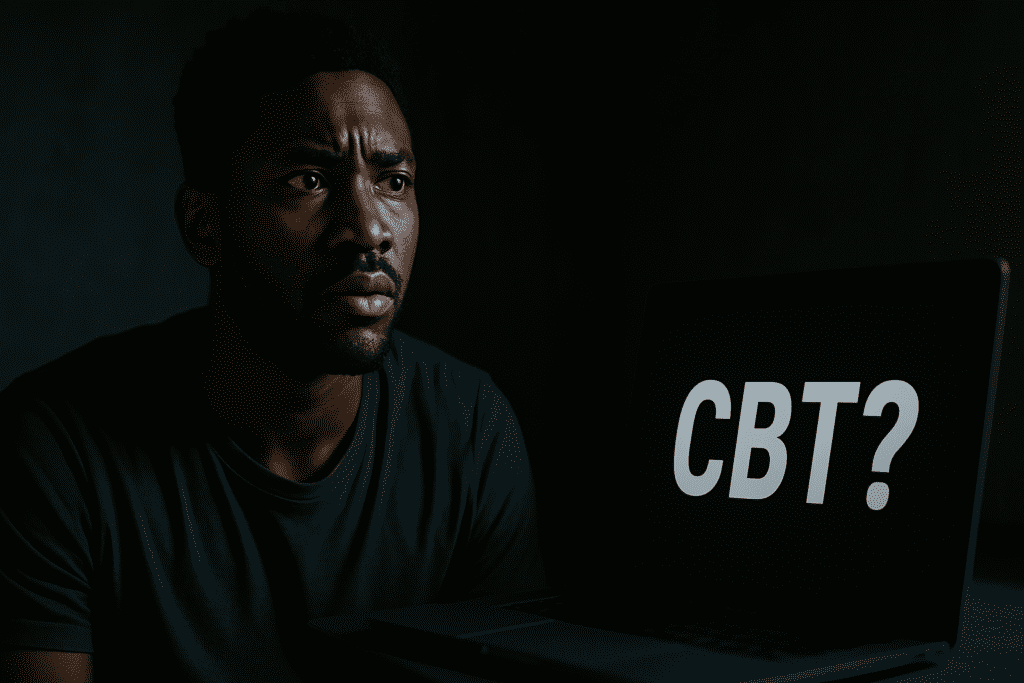In today’s rapidly evolving digital landscape, acronyms and slang terms frequently take on lives of their own, often morphing far beyond their original meanings. One such acronym that has sparked curiosity, confusion, and conversation across social media platforms is CBT. Depending on context, CBT can refer to something deeply therapeutic and evidence-based—Cognitive Behavioral Therapy—or to something entirely different within internet subcultures. Understanding the dual identity of this term is not merely a matter of linguistic curiosity; it has implications for mental health awareness, digital literacy, and the broader public understanding of psychological well-being. In this article, we explore the meaning of CBT in slang, examine how it differs from its clinical usage, and consider why clear communication about mental health terminology is more important than ever in the online age.
You may also like: How Does CBT Work to Improve Relationships and Communication? Science-Backed Techniques for Getting Along with Others
The Clinical Definition of CBT: A Cornerstone of Mental Health Treatment
Before diving into the slang usage, it’s critical to establish what CBT means in its original and most impactful context. Cognitive Behavioral Therapy is a scientifically validated form of psychotherapy that focuses on identifying, challenging, and replacing negative thought patterns and behaviors. It is commonly used to treat anxiety disorders, depression, PTSD, and other emotional disturbances. CBT is rooted in the idea that our thoughts influence our feelings and behaviors, and by shifting our cognitive patterns, we can effect meaningful emotional and behavioral change.
Mental health professionals who specialize in CBT often undergo years of training to effectively apply these techniques in therapeutic settings. The acronym CBT, in this sense, carries considerable weight in clinical psychology, standing for a trusted, research-supported approach to emotional healing. Because of its wide-ranging success, CBT has become one of the most frequently recommended forms of therapy by mental health experts worldwide. The acronym CBT is therefore deeply embedded in the lexicon of professional psychology and carries connotations of healing, structure, and evidence-based intervention.
What Does CBT Mean on the Internet? The Rise of Slang Definitions
In stark contrast to its medical and therapeutic roots, the term CBT has been co-opted by various online communities in ways that diverge dramatically from its original meaning. So what does CBT mean on the internet? In online slang, CBT has taken on an entirely unrelated meaning—one that can be humorous, sexual, or even shocking, depending on the context. This version of CBT slang definition is particularly prominent in meme culture, internet forums, and certain subreddits, where abbreviations often serve as a kind of inside joke or coded language.
For example, in some internet communities, CBT refers to a sexual practice that has no connection whatsoever to therapy or mental health. This interpretation of the acronym CBT can catch individuals off guard, particularly those who are researching Cognitive Behavioral Therapy for mental health support. The difference in meanings is not just semantic; it underscores the importance of digital discernment and the ability to understand context. For a term as essential as CBT in psychological circles, such divergent slang usage can lead to confusion and potentially deter individuals from seeking the help they need.
CBT Meaning Slang: How Humor and Misinformation Collide
One of the driving forces behind the slang adaptation of CBT is humor. Internet culture thrives on irony, satire, and subversion, and appropriating serious terms for comedic effect is a common practice. When CBT is used in slang to refer to a joke or an absurd contrast to its original meaning, the intent is often to generate surprise or laughter. While humor can be a coping mechanism and a form of cultural expression, it can also blur the line between credible information and misinformation.
The CBT slang definition can become particularly problematic when it interferes with public understanding of mental health. Someone unfamiliar with Cognitive Behavioral Therapy who encounters the slang version online may develop misconceptions about the legitimacy or nature of the therapy. In some cases, this could discourage individuals from seeking treatment, or it could lead to awkward misunderstandings in professional or academic settings. As such, it’s important to be aware of how slang can distort the perception of essential health-related concepts.
Exploring the Dual Identity of CBT Online: Therapy vs. Internet Subculture
The acronym CBT now exists in a kind of semantic double exposure. On one side, you have the acronym CBT representing one of the most widely respected psychological interventions of the modern age. On the other, you have CBT slang operating as a niche internet joke or euphemism that carries vastly different implications. Navigating this dual identity requires digital literacy and a careful understanding of context.
In mental health forums and websites like Health11News.com, CBT is clearly presented in its clinical context. Articles, academic papers, and therapeutic resources refer to Cognitive Behavioral Therapy with the expectation that readers understand its scientific foundation. However, in spaces like Reddit, 4chan, and Twitter (now X), the slang definition of CBT may appear with little or no context, creating a jarring contrast for those unfamiliar with internet culture. It is essential for mental health communicators, clinicians, and educators to be aware of this dichotomy and address it directly when engaging with the public.
The CBT Abbreviation and Mental Health Literacy in the Digital Age
Acronyms are inherently prone to ambiguity, especially in the digital age where context can shift rapidly. The CBT abbreviation illustrates how even medically grounded terminology can become entangled in slang, leading to potential miscommunication. In fields like mental health, where clarity and precision are paramount, such ambiguity can have real-world consequences. That’s why understanding what CBT means in slang is not just a matter of internet fluency—it is an issue of health literacy.
Mental health literacy refers to the knowledge and beliefs that aid in the recognition, management, or prevention of mental health problems. When acronyms like CBT are misunderstood due to conflicting slang definitions, it can hinder this literacy. Someone searching online for therapeutic techniques may encounter memes or slang definitions that trivialize or distort the concept, thus undermining their understanding. For clinicians, educators, and advocates, this highlights the need to ensure that accurate, evidence-based definitions of key terms are readily accessible and clearly distinguished from their slang counterparts.
Why It Matters: The Risks of Misinformation and Misunderstanding
Misinformation in the realm of mental health is not a trivial concern. When slang terms like CBT meaning sus begin to eclipse their original definitions in online searches or public conversations, the risk of misunderstanding increases. In particular, the phrase “CBT meaning sus” reflects a growing skepticism or joking suspicion among younger internet users who may encounter the acronym without fully grasping its therapeutic significance.
The word “sus,” shorthand for suspicious or suspect, often implies that something is off or untrustworthy. When paired with CBT, it may signal a disconnect or disbelief in the therapy itself—whether genuine or satirical. While this may begin as a harmless meme or social commentary, it can easily sow seeds of doubt in vulnerable individuals who might otherwise benefit from engaging with Cognitive Behavioral Therapy. By reinforcing misunderstandings through slang, the internet risks perpetuating stigma or discouraging legitimate help-seeking behavior.
CBT Slang in Pop Culture and the Role of Satire
The way CBT slang circulates in pop culture is emblematic of a broader phenomenon where clinical terms are appropriated for entertainment. Late-night comedy shows, TikTok trends, and meme accounts frequently reference terms like CBT in ways that completely detach them from their clinical roots. This isn’t new; similar reappropriations have occurred with acronyms like ADHD, OCD, and PTSD. However, CBT is particularly vulnerable because it is an abbreviation that lends itself easily to reinterpretation and lacks the phonetic rigidity of other clinical acronyms.
Satirical uses of CBT slang often aim to parody the self-help industry, therapeutic jargon, or the proliferation of wellness trends. While satire can be a powerful tool for social commentary, it also requires a nuanced understanding to be interpreted correctly. Not every reader or viewer has the media literacy required to distinguish satire from legitimate information. As a result, what begins as a joke can inadvertently shape public perception, particularly among impressionable audiences.

Digital Responsibility: Navigating Slang While Promoting Mental Health
Given the ease with which slang spreads online, a proactive approach to digital responsibility is necessary. Platforms, creators, and educators have a role to play in clearly delineating between slang content and factual, evidence-based information. Digital responsibility includes not only fact-checking but also creating content that promotes health literacy, especially in areas as sensitive as mental health.
Encouraging open conversations about slang interpretations can also be a tool for education. Rather than avoiding or censoring the slang version of CBT, mental health professionals and communicators can acknowledge its existence while clarifying its meaning and implications. This dual approach both respects internet culture and preserves the integrity of clinical definitions. When done thoughtfully, it can transform moments of confusion into opportunities for awareness and engagement.
The Importance of Context When Using or Encountering the Acronym CBT
One of the most crucial takeaways from this conversation is the importance of context. The acronym CBT can mean very different things depending on where, how, and by whom it is used. For a psychologist, CBT refers to a rigorous therapeutic model backed by decades of research. For a Reddit user browsing memes, CBT might conjure up a completely different set of associations. This dissonance makes it essential to evaluate the context in which the acronym appears before jumping to conclusions.
Misinterpretations of CBT meaning slang are especially likely in multi-generational settings or when crossing the boundaries between professional and casual digital spaces. Young people encountering the term online may be unaware of its clinical origin, while older adults may not recognize its slang adaptation. Bridging this gap requires intentional communication strategies that include not only definitions but also examples, clarifications, and references to credible sources.
Why Slang Evolves and What It Reveals About Public Discourse
Slang evolves because language itself is a living, breathing entity that reflects the culture in which it is used. The CBT slang definition is one small example of how language responds to societal trends, humor, subversion, and even rebellion against norms. Slang can reveal what topics are culturally salient, what institutions are being questioned, and what forms of expression resonate with specific communities. From this perspective, the slang version of CBT is not merely a distortion—it is a reflection of the broader conversation about mental health, therapy, and the perceived credibility of psychological interventions.
Understanding slang’s evolution allows us to engage more critically with the language we encounter online. Rather than dismissing slang as irrelevant or immature, we can analyze it to gain insight into cultural attitudes and potential areas of misunderstanding. This is especially important for mental health professionals, who must now operate in a world where the boundaries between clinical and colloquial language are increasingly porous.
Building Bridges Between Clinical Precision and Cultural Relevance
To reduce confusion and promote accurate mental health awareness, there must be a bridge between the precision of clinical terminology and the fluidity of cultural slang. This involves not only educating the public about what CBT means in a therapeutic context but also acknowledging the presence of slang without judgment or alarm. Transparency and empathy are key. When people feel respected in their understanding and are provided with clear, accessible information, they are more likely to engage with mental health resources in meaningful ways.
Schools, mental health organizations, and media outlets can all contribute to this effort by developing resources that clarify common acronyms, explain their different meanings, and provide trustworthy links to professional guidance. These educational efforts should be updated regularly to reflect the fast pace of digital culture and the shifting meanings of popular terms. Ultimately, bridging the gap between clinical language and internet slang is an act of service that upholds the values of clarity, compassion, and informed care.

Frequently Asked Questions: Understanding CBT Slang, Its Internet Evolution, and Mental Health Implications
1. How did the slang meaning of CBT gain popularity on the internet?
The slang usage of CBT emerged from niche internet communities, particularly those known for pushing boundaries of humor, such as 4chan and Reddit. As digital subcultures evolved, these spaces began repurposing clinical terms into jokes or euphemisms to shock or amuse readers. The acronym CBT was an ideal candidate for this reinterpretation because it has an authoritative sound yet is ambiguous without context. This duality allowed the slang version to flourish through memes, inside jokes, and internet satire. As more users questioned the legitimacy or oddity of this slang, search queries like “cbt meaning sus” and “what does CBT mean on the internet” began trending, inadvertently boosting its visibility and blending it with its clinical counterpart in public consciousness.
2. Why is the slang definition of CBT sometimes considered problematic in health communication?
The cbt slang definition can undermine serious conversations about mental health, especially when people misunderstand or dismiss its therapeutic importance. Misinformation spreads quickly online, and terms used out of context risk trivializing evidence-based treatments. When slang use overshadows legitimate medical meaning, people searching for help may be deterred by confusing or inappropriate content. Furthermore, younger users may be more familiar with the meme-based interpretation than the clinical one, making the acronym CBT a source of ridicule instead of support. As such, the crossover between CBT slang and professional discourse highlights the need for clearer digital boundaries in mental health communication.
3. What strategies can mental health educators use to address CBT slang without dismissing internet culture?
Mental health educators should strive to integrate digital literacy into therapeutic education, especially when addressing topics like the cbt slang definition. Rather than ignoring or condemning slang, educators can use it as a springboard for conversation. By acknowledging the slang meaning of CBT in a nonjudgmental way, professionals can engage younger audiences and redirect attention to accurate information. Explaining both the acronym CBT and its cultural reinterpretations builds trust, allowing students or clients to feel understood rather than corrected. This approach bridges the gap between credible healthcare and the rapidly evolving language of internet communities.
4. Does the term “CBT meaning sus” signal deeper skepticism toward therapy among younger audiences?
Yes, the phrase “cbt meaning sus” reflects more than a simple internet joke—it can suggest underlying doubts about mental health treatments. The slang framing implies suspicion or disbelief, often stemming from lack of exposure to therapy or prior negative experiences. In a broader context, it reveals how humor is used as a defense mechanism, especially in online spaces where vulnerability is discouraged. The growing popularity of memes casting therapy terms in a suspicious light may reveal systemic issues, such as barriers to access or perceived ineffectiveness of traditional models. This makes it essential to clarify the acronym CBT while also addressing emotional attitudes surrounding therapy.
5. How can the misunderstanding of CBT slang impact search engine results for people seeking mental health help?
Search engine algorithms prioritize relevance and popularity, so viral interpretations of terms can eclipse medical meanings in search rankings. When someone types “what does CBT mean on the internet,” they might encounter explicit or comedic content before they see therapeutic resources. This risks confusion or embarrassment, especially for individuals in distress who are earnestly searching for mental health support. The presence of cbt slang in top search results can discourage help-seeking or redirect users to unreliable sources. To counteract this, SEO strategies should elevate evidence-based content using clear, engaging language and relevant keyword phrases like “cbt abbreviation” and “cbt meaning slang.”
6. What role does media literacy play in distinguishing between CBT slang and its clinical meaning?
Media literacy equips individuals to critically evaluate the information they encounter online. In the context of cbt slang, this means recognizing tone, audience, and intent behind how a term is used. Someone well-versed in media literacy can differentiate between a meme mocking the acronym CBT and a peer-reviewed article explaining its use in cognitive therapy. Education systems can help by teaching digital discernment, encouraging students to question sources and trace information back to its origin. This skill set not only aids in understanding the cbt slang definition but also supports broader mental health awareness and responsible internet use.
7. Could the confusion around CBT slang lead to accidental stigma against legitimate therapy methods?
Absolutely. When slang meanings dominate public perception, they can contribute to stigma by framing serious topics as laughable or taboo. The acronym CBT, when reduced to a joke or euphemism, risks being associated with embarrassment rather than empowerment. This can affect how individuals view therapy overall, possibly leading them to internalize shame or reject treatment. Although humor can reduce tension, the cbt slang definition must be contextualized to avoid undermining mental health advocacy. Promoting narratives that emphasize the success and science behind CBT can help reestablish its credibility and distinguish it from slang distortions.
8. How do therapists respond when clients bring up slang definitions like “CBT meaning sus” in sessions?
Many therapists see this as a unique opportunity to build rapport and discuss misconceptions. When clients mention cbt slang, it often reflects curiosity, confusion, or a desire to discuss therapy in relatable terms. Clinicians can use this moment to explain the evidence-based nature of Cognitive Behavioral Therapy and validate the client’s feelings about how mental health is portrayed online. By incorporating humor and cultural references into therapy sessions, therapists make themselves more approachable while also correcting misinformation. This open-minded approach allows clients to explore what they’ve seen online, including slang like “cbt meaning sus,” in a safe, nonjudgmental space.
9. What long-term effects could the popularization of CBT slang have on digital mental health resources?
If the slang version of CBT continues to trend, it could influence how future digital health resources are developed and optimized. Platforms may need to rethink keyword targeting, ensuring that searches for “cbt meaning slang” or “what does CBT mean on the internet” lead to informative, context-sensitive results. Designers of health apps and websites may also need to include disclaimers or educational pop-ups when slang terms intersect with clinical content. The long-term goal should be to balance cultural relevance with scientific accuracy, ensuring that the cbt abbreviation maintains its therapeutic integrity while acknowledging the evolving digital landscape.
10. Can slang reinterpretations of medical acronyms like CBT ever be beneficial?
While initially confusing, slang adaptations can create openings for education and engagement. The viral spread of the cbt slang definition increases visibility for the term, sparking curiosity that can lead people to research its true meaning. If guided properly, this attention can funnel users toward reliable information and destigmatize therapy. Furthermore, slang offers a cultural mirror, revealing how society relates to therapy and mental health at large. By understanding what CBT means on the internet and responding with informed, thoughtful content, health communicators can turn digital trends into educational opportunities that ultimately support public well-being.

Conclusion: Why Understanding the Slang Meaning of CBT Matters for Mental Health Awareness
In an age where information is shared at lightning speed, and acronyms like CBT can mean radically different things in different contexts, understanding language deeply and responsibly is more important than ever. The phrase “CBT meaning sus” may seem like a harmless joke or a niche internet reference, but it also symbolizes a growing divide between clinical expertise and online interpretation. By exploring both the therapeutic and slang definitions of the CBT abbreviation, we not only deepen our linguistic awareness but also reaffirm our commitment to mental health literacy.
Mental health professionals, educators, and digital communicators must work together to clarify these meanings and ensure that essential therapeutic concepts like Cognitive Behavioral Therapy are not lost in translation. As internet culture continues to evolve, maintaining the integrity of mental health terminology is a vital part of promoting wellness, reducing stigma, and guiding people toward the help they need. Understanding the dual meaning of CBT—and the risks of miscommunication—is a small but meaningful step toward a more informed, compassionate digital world.
internet slang explained, mental health terminology, cognitive therapy awareness, online meme culture, therapy misconceptions online, digital health literacy, humor and mental health, psychology in internet culture, redefining clinical acronyms, youth and mental health stigma, mental health communication strategies, internet language evolution, therapeutic language vs slang, popular acronyms online, decoding online language, social media and therapy, misinformation in mental health, digital culture and wellness, slang and stigma, responsible internet communication
Further Reading:
What is Cognitive Behavioral Therapy?
Overview – Cognitive behavioural therapy (CBT)
What Does CBT Mean and What is it Used For?
Disclaimer
The information contained in this article is provided for general informational purposes only and is not intended to serve as medical, legal, or professional advice. While Health11News strives to present accurate, up-to-date, and reliable content, no warranty or guarantee, expressed or implied, is made regarding the completeness, accuracy, or adequacy of the information provided. Readers are strongly advised to seek the guidance of a qualified healthcare provider or other relevant professionals before acting on any information contained in this article. Health11News, its authors, editors, and contributors expressly disclaim any liability for any damages, losses, or consequences arising directly or indirectly from the use, interpretation, or reliance on any information presented herein. The views and opinions expressed in this article are those of the author(s) and do not necessarily reflect the official policies or positions of Health11News.


